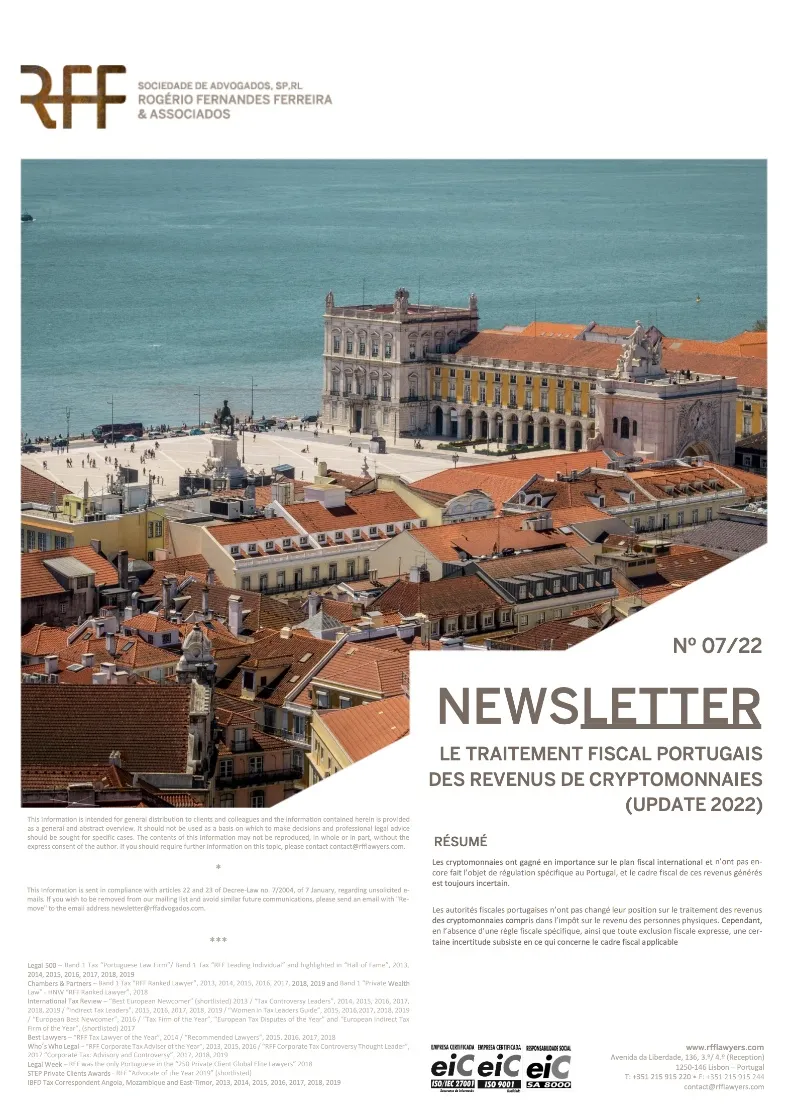The Portuguese income tax treatment of cryptocurrency income (UPDATE 2022)

The Portuguese income tax treatment of cryptocurrency income (UPDATE 2022)
SUMMARY
Cryptocurrencies have been gaining prominence in the international financial plan. However, these “currencies” have not yet been subject to specific regulation in Portugal, and the tax framework of the income derived therefrom is still uncertain.
The Portuguese Tax Authorities have not changed their position on the tax treatment of income from cryptocurrencies within Personal Income Tax. However, in the absence of a specific taxation rule, as well as any express tax exclusion, some uncertainty remains regarding the applicable tax framework.
INTRODUCTION
The nature of currency has evolved over time, passing through the scriptural currency – banknotes, liable to exchange for gold or silver – to the fiduciary currency – which has no intrinsic value, but is declared as having legal tender and issued by a Central bank, ensuring its value stability.
The current currency may also exist without a physical representation: in a bank account in the form of a computer register or deposited in a savings account.
However, other digital currencies are not under the jurisdiction of a centralized control entity, such as a Central Bank and, from a legal point of view, these currencies are not considered legal tender, and this is precisely the case for cryptocurrencies.
Cryptocurrencies are, in practice, computer code lines, to which a certain value is assigned. As these assets are traded through validation in a decentralized database system (peer-to-peer network), permanently listing the record of all transactions (blockchain), the cryptocurrencies remain protected from falsification or theft, as well as the identity of its holder is preserved.
The Portuguese legislator defines virtual assets as "a digital representation of value which is not necessarily associated to a legal currency and which does not have the legal status of fiat currency, but which is accepted by individuals or legal persons as a means of exchange or investment and which can be transferred, stored and traded electronically".
However, said definition does not solve the problems related to the qualification and, consequently, the legal tax framework of cryptocurrencies in Portugal.
THE ISSUES AT STAKE
Bitcoin, one type of cryptocurrency, with high popularity growing all over the world, was the currency that valued the most in the last years, worthing already more than gold. In fact, cryptocurrencies have been gaining prominence in the international financial plan, being used as an option for investors seeking high return and protection for their assets.
However, the reason for its choice also constitutes its biggest problem: being a digital value not subject to the constraints of monetary and exchange policies (defined and controlled by the Central banks), its volatility and manipulation have been high.
In the light of these characteristics, and because there is no concrete legal framework for cryptocurrencies, doubts have been raised concerning their legal framework, in particular regarding their taxation in Portugal.
THE TAX FRAMEWORK
Under Portuguese tax law, individuals are taxed under Personal Income Tax (“PIT”), which comprises several income categories.
Gains, in particular, are taxed under PIT’s category G. However, this is a closed category, which does not comprise all types of gains, but essentially, movable property capital gains (realized through the sale of securities) and immovable property capital gains (realized through the sale of real estate property).
Being a closed category, and not expressly foreseeing gains realized through the sale of cryptocurrency, it could be said, at the ousted, that gains derived from the investments in this type of assets would not be subject to PIT.
However, there are other PIT categories in which these gains – earnings from the investment in cryptocurrency – may fall: category E (investment income) and category B (self-employment income).
In fact, both are open income categories (the latter insofar there is an associated business or professional self- employed activity).
Indeed, and in accordance with the letter of the law, it is sustainable that the income derived from the investment in cryptocurrencies corresponds to a gain from the capital investment and should be taxed within the scope of category E.
On the other hand, and whenever the investment activity in cryptocurrency is carried out in a professional manner – which implies a global analysis of the individual’s personal and tax situation and the verification of certain characteristics and premises –, the respective gains must be taxed under category B.
THE TAX AUTHORITIES INTERPRETATION
Notwithstanding this legal framework, in the absence of an express mention of cryptocurrencies included as a type of assets within the applicable rules, many interpretations of the law can actually be made.
According to a first binding information issued by the Portuguese Tax Authorities on this subject, the profits obtained from the sale of cryptocurrencies are not taxed in Portugal, as long as these are not obtained within a professional or businessactivity developed by the taxpayer. According to such information, income resulting from the sale of cryptocurrencies is not taxable within Personal Income Tax (“PIT”), particularly within category E (investment income) or G (capital gains), regardless of the value of the profits attained. Thus, unless the taxpayer develops a professional or business activity of investments in cryptocurrency, no taxation shall be due within PIT for profits relating to the purchase or sale of virtual currencies. These profits will only be taxed "when, by its habituality, it constitutes a professional or business activity of the taxpayer, in which case it will be taxed in category B".
In fact, “habituality” is one of several criteria used to assess whether a particular activity is carried out in a professional manner or with business characteristics, criteria which will always have to be assessed globally with the rest of the personal and professional life of the individual taxpayer.
In another direction, through an e-mail answering a question posed by a taxpayer through the Tax Authorities’ website, the Tax Authorities stated that "despite the fact that the current Portuguese tax legislation does not specifically contemplate this type of activity, we understand that such income constitutes a distribution of profits, in proportion to their participation (investment) ", concluding that "in these terms, such distribution would fall under the qualification of income from capital, as provided in article 5 of the PIT code ". However, such e-mail information has not been disclosed in a generic or official manner by the Tax Authorities, therefore it should not be understood as an official position. In any case, the lack of consensus is clear, even within the Tax Authorities, with the matter remaining controversial.
In another binding information provided by the Tax Authorities on this topic, focusing not on PIT, but rather on Value Added Tax (“VAT”), the position already assumed by the Court of Justice of the European Union was reiterated. This Court had already clarified that "the Bitcoin, like traditional currencies that have liberator value, have no other purpose than to serve as a means of payment. " This means that "in the case of means of payment whose function is exhausted in itself, its mere transfer does not constitute a [VAT] chargeable event”.
On the other hand, transactions consisting on the exchange of this virtual currency by traditional currencies, or vice versa, in exchange for consideration, which are taxable in Portugal by means of the localization rules provided for in the VAT Code, shall be deemed exempt from tax under article 9 (27) (d) of the VAT Code.
CONCLUSIONS
The lack of specific regulation of the income derived from the investment in cryptocurrency remains today.
Thus, the legal framework remains, such as the respective interpretation by the Tax Administration, which, to date, and as far as we know, has not promoted the taxation of gains derived from investment in cryptocurrencies by individual investors.
It should be noted that we have focused here only on investing in cryptocurrencies, through their purchase and sale, and not through mining or receiving them as payment for goods or services. In fact, these flows are distinct and will have their own framework.
Furthermore, the perspective explained above is that of the individual investor, whether sporadically or professionally, and not the investor-company. In fact, companies are taxed in Portugal under the Corporate Income Tax (“CIT”), which is levied on the respective profit. So, insofar the gains made with cryptocurrencies are registered in the company's accounting, they will enter into the company's taxable profit.
That said, the tax framework of cryptocurrencies in Portugal, in 2022, should remain as it is: in principle, the gains made, by individual investors, through the purchase and sale of this type of currency shall be excluded from taxation under PIT (except if they are obtained within the exercise of a professional or business activity, which implies a global analysis of the taxpayer’s situation).
Notwithstanding, it is advisable that taxpayers maintain a register capable of justifying the origin of their income, especially if they incur in certain expenses, potentially seen by the tax legislator as unjustified manifestations of wealth.
We conclude that the current lack of tax framework for cryptocurrencies keeps Portugal on the (increasingly shorter) list of countries that do not yet tax the income arising from this type of assets, which may consolidate the country as an attractive destination for investors.
***
Lisbon, March 7, 2022
Rogério M. Fernandes Ferreira
Duarte Ornelas Monteiro
Joana Marques Alves
Ricardo Miguel Martins
Vanessa Lopes Rodrigues
Teresa Verdasca Salgueiro
Gonçalo Brites Silva
Marta Cabugueira Leal
João Rebelo Maltez
(Private Clients Team)
